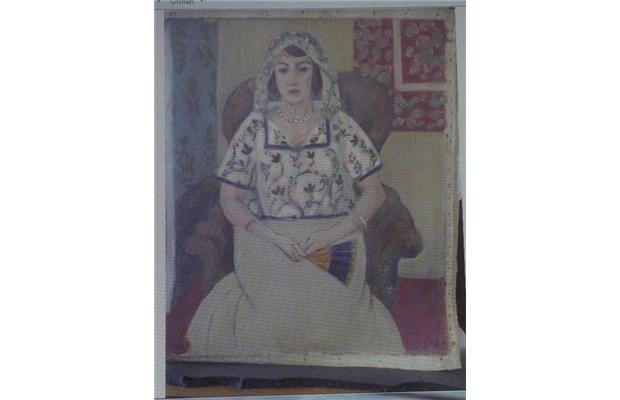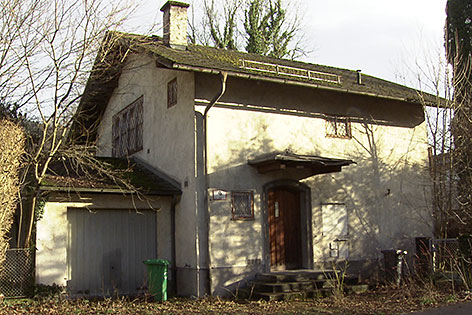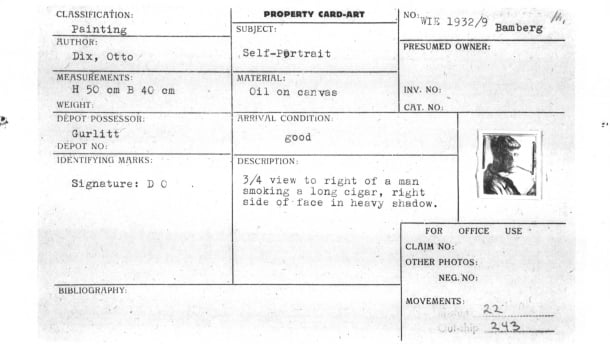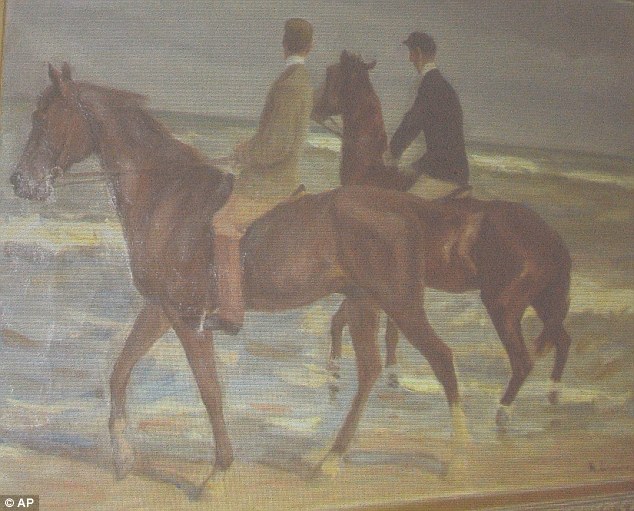The Gurlitt Task Force has issued its first public conclusion about the status of work amongst the collection found in Cornelius Gurlitt's apartment. Chair Ingebeborg Berggreen-Merkel issued a statement today that (my translation):
Gurlitt Task Force Makes First Determination that Matisse "Seated Woman" Was Stolen From Rosenbergs; Questions Remain About What Happens Next
Topics: Schwabinger Kunstfund, Hildebrand Gurlitt, Cornelius Gurlitt, Gurlitt Task Force, Nazi-looted art, Gurlitt Collection, Entartete Kunst, Munich art trove, Anne Sinclair, NS Raubkunst, Restitution, World War II, Kunstmuseum Bern, Washington Principles, Sitzende Frau, Kunstfund München, Henri Matisse, Paul Rosenberg
Gurlitt Bequest to Kunstmuseum Bern: German Language Analysis Roundup
Discussion continues to swirl about how the passing of Cornelius Gurlitt this week will affect the review and possible return of the paintings found in his Munich apartment, and those in Austria. Not surprisingly, the majority of reflections on the news that Gurlitt appointed the Kunstmuseum in Bern, Swizterland as his sole heir are in German, Austrian, and Swiss publications. Here are is my roundup of the latest reports:
Topics: Neue Zürchner Zeitung, Schwabinger Kunstfund, Ingeborg Bergreen-Merkel, Stephan Holzinger, Bad Aussee, Cornelius Gurlitt, Monopol, Gurlitt Task Force, Germany, will, Nazi-looted art, Gurlitt Collection, Matthias Frehner, Entartete Kunst, Salzburg, Restitution, ORF, World War II, Switzerland, Süddeutsche Zeitung, heir, Austria, Kunstmuseum Bern, Washington Principles, Nazi Raubkunst, validity
German Museums Join in Demands for More Information About Gurlitt; Links to the Amber Room Theorized; Dix Painting Was Not Unknown
Der Spiegel reports today (link in German) about how German museums are joining the chorus of frustration about the lack of information about the Hildebrand and Cornelius Gurlitt collection find. From this perspective, this development is not a surprise. I was speaking to an international law class last night at Sarah Lawrence College, and one of the students asked me what the reaction in Germany would be. My feeling was that sooner rather than later, the German museum community, and likely the federal government, will push for a forward-looking solution. Present-day Germany takes questions about the Holocaust quite seriously, and for this collection to have turned up in Germany is sparking an embarrassment that could lead to more decisive action. The problem right now seems to be that everyone is waiting for someone else to make the first move.
Topics: Jeu de Paume, unbekannte Meisterwerke, February 13 1945, FAZ, Focus, Hildebrand Gurlitt, Dresden firebombing, Max Fisher, Cornelius Gurlitt, S. Lane Faison, Linz Führermuseum, Munich Central Collecting Point, Monopol, Wiesbaden Collecting Point, Dresden, HARP, Reinhard Nemetz, Max Liebermann, WWII, Monuments Men, Gurlitt Collection, Max Beckmann, Otto Dix, Degenerate Art: The Fate of the Avant-Garde in Naz, Auktionshaus Lempertz, Entartete Kunst, Fine Arts and Archives Program, Nazis, Marc Chagall, Organisation Todt, Paul Klee, Entdeckung verschollener Kunst, beschlagnahmte Bilder, Dresdner Bank, Belvedere, Fritz Todt, Holocaust Art Project, Hamburg Kunstverein, MFAA, Roberts Commission, Angela Merkel, Restitution, Wien, Monuments Fine Arts and Archives, Selbstporträt, World War II, degenerate art, Erben, Raubkunst-Bildern, Portrait of Wally, Washi, Löwenbändiger, Austria, Franz Marc, Oskar Kokoschka, Washington Principles, Ernst Ludwig Kirchner, München, Pablo Picasso, Dr. Herman Voss, Museums, Kristallnacht, Riders on the Beach, Hans Posse, Nazi Raubkunst, Vienna, Alfred Weidinger, Henri Matisse, Self Portrait, Emil Nolde
Focus Turns to Hildebrand Gurlitt’s Postwar Interrogation; Cornelius Gurlitt’s Whereabouts. Belvedere Official Questions Whether Collection Was Really a Secret
Topics: Jeu de Paume, unbekannte Meisterwerke, February 13 1945, FAZ, Focus, Hildebrand Gurlitt, Dresden firebombing, Max Fisher, Cornelius Gurlitt, S. Lane Faison, Linz Führermuseum, Munich Central Collecting Point, Monopol, Wiesbaden Collecting Point, Dresden, HARP, Reinhard Nemetz, Max Liebermann, WWII, Monuments Men, Gurlitt Collection, Max Beckmann, Degenerate Art: The Fate of the Avant-Garde in Naz, Auktionshaus Lempertz, Entartete Kunst, Fine Arts and Archives Program, Nazis, Marc Chagall, Organisation Todt, Paul Klee, Entdeckung verschollener Kunst, beschlagnahmte Bilder, Dresdner Bank, Belvedere, Fritz Todt, Holocaust Art Project, Hamburg Kunstverein, MFAA, Roberts Commission, Angela Merkel, Restitution, Wien, Monuments Fine Arts and Archives, World War II, degenerate art, Erben, Raubkunst-Bildern, Portrait of Wally, Washi, Löwenbändiger, Austria, Franz Marc, Oskar Kokoschka, Washington Principles, Ernst Ludwig Kirchner, München, Pablo Picasso, Dr. Herman Voss, Kristallnacht, Riders on the Beach, Hans Posse, Nazi Raubkunst, Vienna, Alfred Weidinger, Henri Matisse, Emil Nolde
Rutgers Law Review Article Advocates Replacing Restitution Litigation with Prosecutions
The Rutgers Journal of Law and Religion has published a provocative article that advocates a bold new take on Holocaust art restitution litigation. The thesis of the piece is easily gleaned from its title: “Nazi Looted Art and Cocaine: When Museum Directors Take It, Call the Cops.” In a nutshell, the article argues that if artwork were stolen during World War II, it can never be acquired legitimately thereafter, and its possession is by definition a violation of the National Stolen Property Act, 18 U.S.C. § 2314—or even the Racketeer-Influenced Corrupt Organizations Act (RICO).
Topics: 18 U.S.C. § 2314, Girolamo Romano, Christ Carrying the Cross Dragged by a Rogue, Bakalar v. Vavra, Rutgers Journal of Law and Religion, Raymond Dowd, Egon Schiele, ARCA Conference, Portrait of Wally, RICO, Washington Principles, Racketeer-Influenced Corrupt Organizations Act, National Stolen Property Act, Copyright Litigation Blog
Von Saher claim against Norton Simon Museum dismissed as preempted under foreign affairs doctrine.
Raising another hurdle to restitution claims, the U.S. District Court in Los Angeles against the Norton Simon Museum to the remnants of the famed Jacques Goudstikker collection, on the grounds that her case is preempted by the United States’ foreign affairs doctrine. In an unusually apologetic decision, the court ruled that regardless of the merits of her claims, the law of foreign affairs makes the dispute inappropriate for resolution by civil litigation.
Topics: Terezin Declaration, Norton Simon Museum, Hungary, Thyssen-Bornemisza Collection, Jacques Goudstikker, Cassirer, Hungarian National Gallery, George Stroganoff-Scherbatoff, Holocaust Victims Redress Act, Restitution, Marei Von Saher, World War II, Foreign Sovereign Immunities, Lucas Cranach the Elder, Rue St. Honoré, Camille Pissarro, Göring, Soviet Union, Washington Principles, California Code of Civil Procedure 354.3
The 2nd Circuit Pulls Back on the Reach of the FSIA, Upholds Dismissal of Claim Against Switzerland for Van Gogh Drawing
After recent expansions of the scope of the Foreign Sovereign Immunities Act, the 2nd Circuit Court of Appeals has narrowed that statute’s route of access to the courthouse again. The 2nd Circuit affirmed on November 30, 2011 the District Court’s March 11, 2011 dismissal of Andrew Orkin’s claims to recover a Vincent Van Gogh drawing against the Swiss Confederation, the Oskar Reinhart Foundation, and the Oskar Reinhart Collection.
Topics: Von Saher, Margarethe Mauthner, Germany, Cassirer, Vincent Van Gogh, FSIA, Restitution, World War II, Foreign Sovereign Immunities, Washington Principles
Neue Nationalgalerie in Berlin Returns Schmidt-Rotluff Paintings to Graetz Heirs
The regional government of Berlin has decided to return two paintings by German Expressionist Karl Schmidt-Rotluff to the heirs of the paintings’ one-time owner (article in German).
As reported by Catherine Hickley of Bloomberg in Berlin, the paintings, a 1920 self-portrait and a 1910 landscape entitled “Farm in Dangast” once belonged to Robert Graetz, a businessman from Berlin who was deported to Poland in 1942. After a claim by Graetz’s grandson Roberto (Graetz), a government panel headed by Jutta Limbach (a former constitutional judge) concluded that the loss was almost certainly the product of persecution and should be returned. Berlin Culture Secretary Andre Schmitz has now said that the government will follow the panel’s recommendation.
Topics: Berlin, Catherine Hickley, Karl Schmidt-Rotluff, Robert Graetz, Restitution, Farm in Dangast, World War II, degenerate art, Jutta Limbach, Washington Principles






